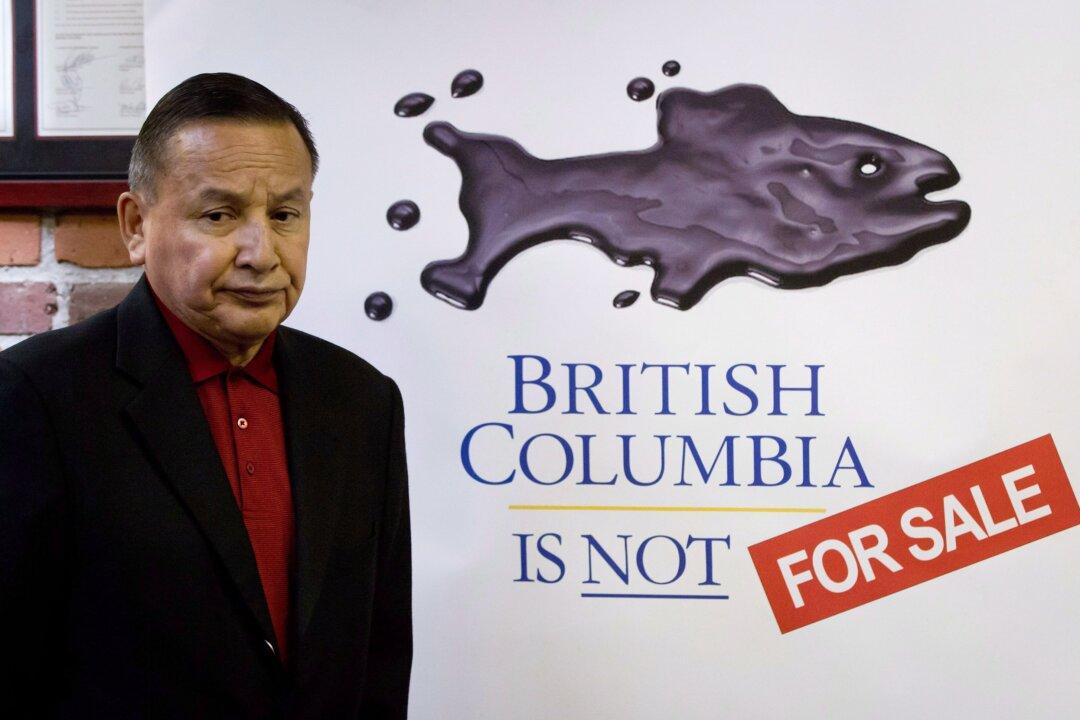No one was holding their breath over what Ottawa would decide on the Northern Gateway pipeline megaproject.
Approval was never really in doubt, despite the heated criticism the project has attracted from those worried that bitumen shipped from Alberta’s oilsands to the British Columbia coast would find its way into streams, forests, and ocean waters.
So when the government endorsed the National Energy Board’s conditional approval of the pipeline at a little after 5 p.m. on Tuesday, June 17, response was swift.
Northern Gateway supporters like unions were drowned out in the deluge of denouncements from environmentalists, political opponents, First Nations, and others.
But federal approval of the pipeline is only a first step. British Columbia still has to give the go-ahead and then there are up to a dozen lawsuits from First Nations waiting to be launched, according to Grand Chief Stewart Phillip, president of the Union of BC Indian Chiefs.
“Opposition to Enbridge’s Northern Gateway heavy oil pipeline proposal in B.C. is enormous, widespread, and deeply entrenched. The vast majority of British Columbians are steadfastly opposed to this project,” said Phillip.
Unless Enbridge finds a way to win over its most legally powerful challengers—the indigenous people’s that have unceded territories impacted by the pipeline—it will be years before the court cases finish and we know once and for all whether Northern Gateway will move ahead.
In the meantime, battle lines are being drawn. Phillip says the B.C. Civil Liberties Association is already giving legal workshops in arrest procedures “in preparation for the looming conflict ahead.”
Environmental groups are rallying behind First Nations, pledging support and calling for cold, hard cash to fund the upcoming legal battles. The months ahead could see a powerful union of environmentally inclined British Columbians backing legally empowered First Nations.
The federal NDP expect the Northern Gateway decision will play a deciding role in B.C. during the 2015 federal election. That could explain why Conservative MPs were seen as distancing themselves from the decision Wednesday, saying it was a call made by the National Energy Board.
NDP leader Thomas Mulcair promised his party would set the Enbridge decision aside if it won power in 2015.
“Supertankers in the Douglas Channel is pure madness, and it puts a massive risk on lots of economic activity that goes way beyond anything that they’re talking about here.”
Liberal Leader Justin Trudeau was just as absolute. “If I win the honour of serving as prime minister, the Northern Gateway pipeline will not happen,” he said.
The NDP maintain that Trudeau, who supports the Keystone XL pipeline from Alberta to Texas, has come out against the Northern Gateway because ridings in B.C. are up for grabs. There are 21 Tories in B.C., and the NDP claim few will return after the next election if Northern Gateway moves ahead.
Few Alternatives
But for all his opposition, Mulcair doesn’t have a way out for Alberta’s land-locked oil. While Trudeau can proffer Keystone as a pipeline to prosperity for Alberta’s bitumen, the only thing Mulcair can say is he tentatively supports shipping western oil east.
Mulcair wants to see bitumen processed in Alberta, adding value and creating jobs—something industry has shown no intention of doing.
Alternatives are few. No one seems keen on shipping oil by rail after the Lac-Mégantic disaster, though a proposal to expand Kinder Morgan’s pipeline from Alberta to Burnaby, B.C., is less contentious than wholly new projects.
With the Conservative government now positioned on Northern Gateway, the real drama begins. The months ahead are expected to bring protests, lawsuits, and big-money promises.
The feds have left Enbridge responsible for winning over critics and the company has made it a top priority.
Besides the 209 conditions set by the National Energy Board’s Joint Review Panel, Enbridge must also meet five conditions from the B.C. government and get First Nations onside.
The company claims to have done that already with 60 percent of Aboriginal communities impacted by the pipeline, offering them a chance to buy into a 10 percent stake of the project.
Phillip finds those claims of support dubious. He cites the 130 First Nations that signed onto the “Save the Fraser Declaration,” a pledge to not let Northern Gateway to cross their territories and watersheds.
It’s a non-negotiable position, much like that taken by Mulcair and Trudeau.
The NDP and Liberals say the Conservatives set themselves up for a gruelling fight by watering down environmental protections and riding roughshod over critics. Playing more careful politics could have left the field less polarized.
But for the Conservatives, the oilsands in Alberta are guaranteed income in a world beset with economic uncertainty. Getting that money out of the ground and into people’s pockets is, in their minds, the best bet to get re-elected.
Unfortunately for Prime Minister Stephen Harper, his efforts to turn Canada into an energy superpower are still stuck in the oilsands.





